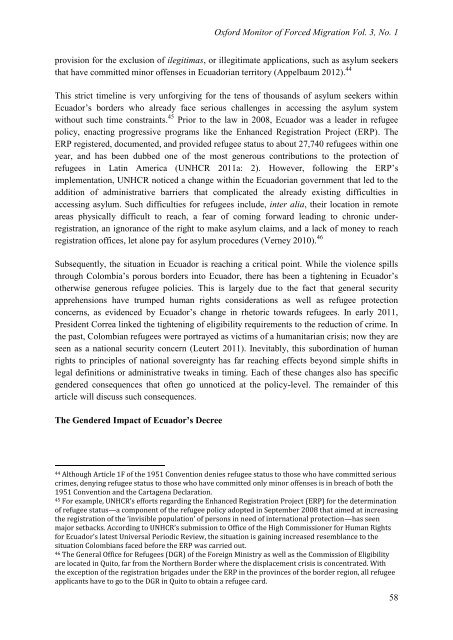OxMo-Vol.-3-No.-1
OxMo-Vol.-3-No.-1
OxMo-Vol.-3-No.-1
You also want an ePaper? Increase the reach of your titles
YUMPU automatically turns print PDFs into web optimized ePapers that Google loves.
Oxford Monitor of Forced Migration <strong>Vol</strong>. 3, <strong>No</strong>. 1<br />
provision for the exclusion of ilegitimas, or illegitimate applications, such as asylum seekers<br />
that have committed minor offenses in Ecuadorian territory (Appelbaum 2012). 44<br />
This strict timeline is very unforgiving for the tens of thousands of asylum seekers within<br />
Ecuador’s borders who already face serious challenges in accessing the asylum system<br />
without such time constraints. 45 Prior to the law in 2008, Ecuador was a leader in refugee<br />
policy, enacting progressive programs like the Enhanced Registration Project (ERP). The<br />
ERP registered, documented, and provided refugee status to about 27,740 refugees within one<br />
year, and has been dubbed one of the most generous contributions to the protection of<br />
refugees in Latin America (UNHCR 2011a: 2). However, following the ERP’s<br />
implementation, UNHCR noticed a change within the Ecuadorian government that led to the<br />
addition of administrative barriers that complicated the already existing difficulties in<br />
accessing asylum. Such difficulties for refugees include, inter alia, their location in remote<br />
areas physically difficult to reach, a fear of coming forward leading to chronic underregistration,<br />
an ignorance of the right to make asylum claims, and a lack of money to reach<br />
registration offices, let alone pay for asylum procedures (Verney 2010). 46<br />
Subsequently, the situation in Ecuador is reaching a critical point. While the violence spills<br />
through Colombia’s porous borders into Ecuador, there has been a tightening in Ecuador’s<br />
otherwise generous refugee policies. This is largely due to the fact that general security<br />
apprehensions have trumped human rights considerations as well as refugee protection<br />
concerns, as evidenced by Ecuador’s change in rhetoric towards refugees. In early 2011,<br />
President Correa linked the tightening of eligibility requirements to the reduction of crime. In<br />
the past, Colombian refugees were portrayed as victims of a humanitarian crisis; now they are<br />
seen as a national security concern (Leutert 2011). Inevitably, this subordination of human<br />
rights to principles of national sovereignty has far reaching effects beyond simple shifts in<br />
legal definitions or administrative tweaks in timing. Each of these changes also has specific<br />
gendered consequences that often go unnoticed at the policy-level. The remainder of this<br />
article will discuss such consequences.<br />
The Gendered Impact of Ecuador’s Decree<br />
44 Although Article 1F of the 1951 Convention denies refugee status to those who have committed serious<br />
crimes, denying refugee status to those who have committed only minor offenses is in breach of both the<br />
1951 Convention and the Cartagena Declaration.<br />
45 For example, UNHCR’s efforts regarding the Enhanced Registration Project (ERP) for the determination<br />
of refugee status—a component of the refugee policy adopted in September 2008 that aimed at increasing<br />
the registration of the ‘invisible population’ of persons in need of international protection—has seen<br />
major setbacks. According to UNHCR’s submission to Office of the High Commissioner for Human Rights<br />
for Ecuador’s latest Universal Periodic Review, the situation is gaining increased resemblance to the<br />
situation Colombians faced before the ERP was carried out.<br />
46 The General Office for Refugees (DGR) of the Foreign Ministry as well as the Commission of Eligibility<br />
are located in Quito, far from the <strong>No</strong>rthern Border where the displacement crisis is concentrated. With<br />
the exception of the registration brigades under the ERP in the provinces of the border region, all refugee<br />
applicants have to go to the DGR in Quito to obtain a refugee card.<br />
58


